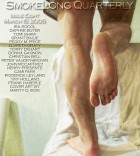I’d love to hear about your inspirations not only for this story, but your writing as a whole.
I’m interested in how people negotiate their way around the world. I like to catch them trying to figure it all out, or coming up with something that works for them. I’m interested in short fiction that brings its characters up to but not through moments of big change
So, what are you working on currently?
I have a novel that an agency in New York is looking at. There may be some revisions coming from that. I am doing the research for a nonfiction book about a fire at a segregated nightclub and preparing an African Lit anthology proposal for another publisher. Writing-wise, I’m playing around with rewriting Don Quixote for contemporary America, but it hasn’t really started to flow yet.
“This is Seattle.” What is Seattle like? What myths need to be debunked about it? And what secret lurks in its underbelly?
I’m not sure. I’m certainly playing on the readers’ relationship with that town (or the idea of it) and the cultural associations it has. I lived there when the whole Grunge thing was just getting started and I didn’t notice a thing. BTW, Sonny Sixkiller’s not dead.
How would you define “flash fiction”?
I think of it as a moment, a vignette of the character(s)’ lives. The way I go about writing short shorts has to be very voice-driven, whether that be a first or third or any other point of view. There are of course many fine exceptions to being voice-driven, so perhaps that’s just how I write them (Robison’s “Yours” or Tallent’s “No One’s a Mystery” come to mind). In all cases though, short shorts function like poetry, in that every word should be precise and charged because you just don’t have much room to bullshit around.
What can writers learn by becoming writing professors/teachers that they might not be able to learn otherwise?
Other than whatever props you can get/feel from the social status, the real benefit comes from working closely with language. Also, in teaching literature, you get to consider what makes a piece successful, why and how it works. And you get to articulate that to/for an audience of lay-people.
The danger, of course, is the ivory tower itself. You run the risk of becoming so far removed from the people that you want to write about that your own prose suffers. It’s hard to write about ‘drinkin, cheatin, killin and hell’ from the confines of one’s office.


